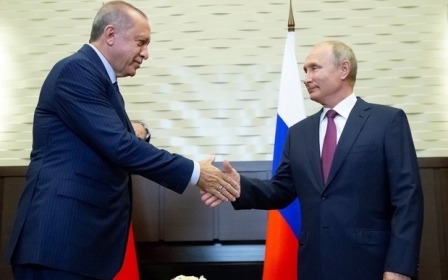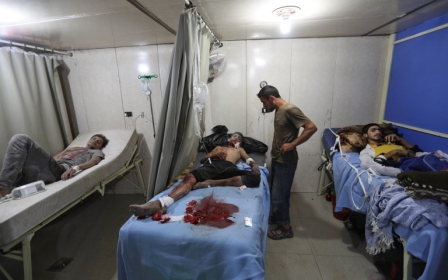Damascus welcomes Idlib deal but still plans to 'liberate last inch' of Syria

Syrian President Basar al-Assad's government has welcomed the agreement between the presidents of Russia and Turkey to create a "demilitarised zone" in the rebel-held province and to call off an assault against rebel-held Idlib.
After more than four hours of talks with Russian President Vladimir Putin at his residence in the Black Sea resort of Sochi, Turkish leader Recep Tayyip Erdogan said on Monday that the deal between their two countries would "prevent a humanitarian tragedy".
Despite welcoming the deal on Tuesday, Damascus indicated that it still planned to recapture Idlib in the future.
The Idlib deal preserves lives of civilians and their direct targeting by the regime. It buries Assad's dreams of imposing his full control over Syria
- Mustafa Sejari, FSA official
"This agreement was the result of intense discussions between Syria and Russia," the Syrian state news agency SANA cited a foreign ministry official as saying.
The government "affirms it is pressing on with its war against terrorism until the liberation of the last inch of Syrian land, whether by military operations or local reconciliation," it said.
However, a senior Syrian rebel official said on Tuesday that the deal had ended Syrian President Bashar al-Assad's hopes of regaining full control of his country.
"The Idlib deal preserves lives of civilians and their direct targeting by the regime," Mustafa Sejari, a prominent Free Syrian Army official, told the Reuters news agency.
"It buries Assad's dreams of imposing his full control over Syria."
'Diplomacy works'
Putin said Russia and Turkey had agreed to create a 15-20km-wide demilitarised zone along the line of contact between rebels and government troops by 15 October.
This would entail a "withdrawal of all radical fighters" from Idlib including the al-Nusra Front, now known as Hay'at Tahrir al-Sham, and also the withdrawal of heavy weaponry including tanks and multiple launch rocket systems, Putin said.
However, reacting on Tuesday, Turkish presidential spokesperson Ibrahim Kalin said the Syrian opposition in Idlib would stay in the same areas they are in now as part of the agreement.
Kalin said on Twitter that Russia and Turkey would conduct joint patrols in the area and that Moscow would take measures to prevent an attack on Idlib as part of the deal.
Meanwhile, Iranian Foreign Minister Mohammad Javad Zarif said on Tuesday that diplomacy between Iran, Turkey and Russia had succeeded in averting war.
"Intensive responsible diplomacy over the last few weeks - pursued in my visits to Ankara & Damascus, followed by the Iran-Russia-Turkey summit in Tehran and the meeting (in) Sochi - is succeeding to avert war in Idlib with a firm commitment to fight extremist terror. Diplomacy works," Zarif wrote on Twitter.
New MEE newsletter: Jerusalem Dispatch
Sign up to get the latest insights and analysis on Israel-Palestine, alongside Turkey Unpacked and other MEE newsletters
Middle East Eye delivers independent and unrivalled coverage and analysis of the Middle East, North Africa and beyond. To learn more about republishing this content and the associated fees, please fill out this form. More about MEE can be found here.




